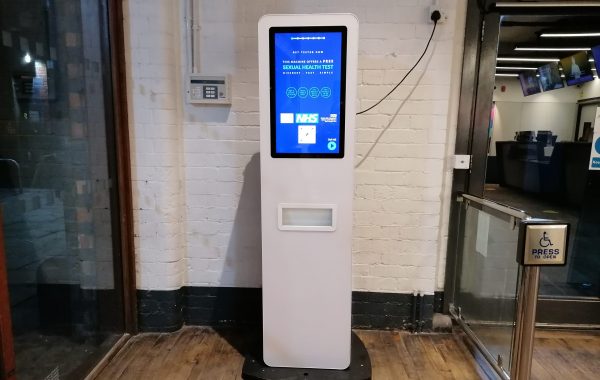5 Feb 2024
Vending machines dispensing test kits for HIV and sexually transmitted infections (STIs) could be useful for improving access to sexual health testing for people who have never tested or don’t test often, according to a paper published in BMJ Sexually Transmitted Infections. Users valued machines for their convenience, ease of use and instant access, although return rates were lower compared to postal kits.

In 2022 the sexual health services led by University Hospitals Bristol and Weston NHS Foundation Trust and University Hospitals Sussex NHS Foundation Trust introduced four vending machines for HIV and STI testing in Bristol, North Somerset and South Gloucestershire and seven machines across Brighton and Hove.
Researchers from the National Institute for Health and Care Research Applied Research Collaboration West (NIHR ARC West), the NIHR Health Protection Research Unit in Behavioural Science and Evaluation (HPRU) at the University of Bristol, the University of Sussex and Brighton, and Sussex Medical School then evaluated the service. They did this by analysing how the service was used with information from:
- machines
- clinics
- responses to an online questionnaire completed by machine users
The research team found that the machines were especially popular among young people and gay, bisexual and other men-who-have-sex-with-men. Uptake was high, which suggests people saw vending machines in public settings as acceptable.
Sixty-eight per cent of people accessing tests from the vending machines had not tested in the last 12 months and 59 per cent had never tested for HIV and STIs. This suggests that the machines encouraged people who do not routinely use sexual health services to get themselves tested.
However, study findings also suggested people may have been put off using the machines because of privacy and safety concerns. Return rates and positivity were also lower when comparing the vending machines with postal kits ordered online. This suggests either a lower risk of infection or users taking tests to use later.
Dr Maya Gobin, joint lead author of the study, said:
“Our study shows that users see vending machines in public spaces as an acceptable means of accessing sexual health testing. Most kits were dispensed to users aged 16-35 years old, who had either not tested in the last 12 months or never tested for HIV and STIs. Ninety-two per cent of respondents thought the machines were user-friendly and 97% would recommend the service. However, some respondents reported concerns about safety and privacy whilst using the machine.
“This is the first time that vending machines dispensing both STI self-sampling and HIV self-test kits have been used in publicly available settings to increase testing amongst people not engaging with sexual health services. They offered increased confidentiality, convenience, and reduced embarrassment, compared to attending a sexual health clinic in person.
“In Bristol the research was funded by University Hospitals Bristol and Weston NHS Foundation Trust and supported by NIHR ARC West at University Hospitals Bristol and Weston NHS Foundation Trust and NIHR HPRU at University of Bristol, in partnership with UK Health Security Agency (UKHSA).”
Further information
About the NIHR
The National Institute for Health Research (NIHR) is the nation’s largest funder of health and care research. The NIHR:
- funds, supports and delivers high quality research that benefits the NHS, public health and social care
- engages and involves patients, carers and the public in order to improve the reach, quality and impact of research
- attracts, trains and supports the best researchers to tackle the complex health and care challenges of the future
- invests in world-class infrastructure and a skilled delivery workforce to translate discoveries into improved treatments and services
- partners with other public funders, charities and industry to maximise the value of research to patients and the economy.
The NIHR was established in 2006 to improve the health and wealth of the nation through research, and is funded by the Department of Health and Social Care. In addition to its national role, the NIHR supports applied health research for the direct and primary benefit of people in low- and middle-income countries, using UK aid from the UK government.